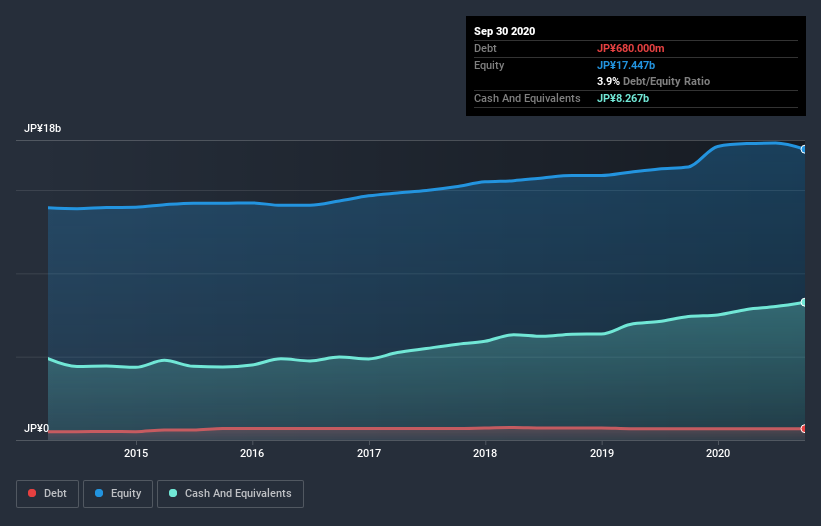Does Sato Foods Industries (TYO:2814) Have A Healthy Balance Sheet?

Legendary fund manager Li Lu (who Charlie Munger backed) once said, 'The biggest investment risk is not the volatility of prices, but whether you will suffer a permanent loss of capital.' So it seems the smart money knows that debt - which is usually involved in bankruptcies - is a very important factor, when you assess how risky a company is. Importantly, Sato Foods Industries Co., Ltd. (TYO:2814) does carry debt. But should shareholders be worried about its use of debt?
When Is Debt A Problem?
Debt is a tool to help businesses grow, but if a business is incapable of paying off its lenders, then it exists at their mercy. Ultimately, if the company can't fulfill its legal obligations to repay debt, shareholders could walk away with nothing. However, a more usual (but still expensive) situation is where a company must dilute shareholders at a cheap share price simply to get debt under control. Having said that, the most common situation is where a company manages its debt reasonably well - and to its own advantage. The first step when considering a company's debt levels is to consider its cash and debt together.
See our latest analysis for Sato Foods Industries
What Is Sato Foods Industries's Net Debt?
As you can see below, Sato Foods Industries had JP¥680.0m of debt, at September 2020, which is about the same as the year before. You can click the chart for greater detail. But it also has JP¥8.27b in cash to offset that, meaning it has JP¥7.59b net cash.

How Strong Is Sato Foods Industries' Balance Sheet?
Zooming in on the latest balance sheet data, we can see that Sato Foods Industries had liabilities of JP¥1.37b due within 12 months and liabilities of JP¥75.0m due beyond that. Offsetting this, it had JP¥8.27b in cash and JP¥1.03b in receivables that were due within 12 months. So it actually has JP¥7.85b more liquid assets than total liabilities.
This surplus liquidity suggests that Sato Foods Industries' balance sheet could take a hit just as well as Homer Simpson's head can take a punch. On this view, lenders should feel as safe as the beloved of a black-belt karate master. Simply put, the fact that Sato Foods Industries has more cash than debt is arguably a good indication that it can manage its debt safely.
It is just as well that Sato Foods Industries's load is not too heavy, because its EBIT was down 29% over the last year. Falling earnings (if the trend continues) could eventually make even modest debt quite risky. There's no doubt that we learn most about debt from the balance sheet. But you can't view debt in total isolation; since Sato Foods Industries will need earnings to service that debt. So when considering debt, it's definitely worth looking at the earnings trend. Click here for an interactive snapshot.
Finally, while the tax-man may adore accounting profits, lenders only accept cold hard cash. While Sato Foods Industries has net cash on its balance sheet, it's still worth taking a look at its ability to convert earnings before interest and tax (EBIT) to free cash flow, to help us understand how quickly it is building (or eroding) that cash balance. Over the last three years, Sato Foods Industries actually produced more free cash flow than EBIT. That sort of strong cash conversion gets us as excited as the crowd when the beat drops at a Daft Punk concert.
Summing up
While it is always sensible to investigate a company's debt, in this case Sato Foods Industries has JP¥7.59b in net cash and a decent-looking balance sheet. The cherry on top was that in converted 110% of that EBIT to free cash flow, bringing in JP¥1.2b. So we don't think Sato Foods Industries's use of debt is risky. There's no doubt that we learn most about debt from the balance sheet. However, not all investment risk resides within the balance sheet - far from it. To that end, you should be aware of the 1 warning sign we've spotted with Sato Foods Industries .
Of course, if you're the type of investor who prefers buying stocks without the burden of debt, then don't hesitate to discover our exclusive list of net cash growth stocks, today.
If you’re looking to trade Sato Foods Industries, open an account with the lowest-cost* platform trusted by professionals, Interactive Brokers. Their clients from over 200 countries and territories trade stocks, options, futures, forex, bonds and funds worldwide from a single integrated account. Promoted
New: Manage All Your Stock Portfolios in One Place
We've created the ultimate portfolio companion for stock investors, and it's free.
• Connect an unlimited number of Portfolios and see your total in one currency
• Be alerted to new Warning Signs or Risks via email or mobile
• Track the Fair Value of your stocks
This article by Simply Wall St is general in nature. It does not constitute a recommendation to buy or sell any stock, and does not take account of your objectives, or your financial situation. We aim to bring you long-term focused analysis driven by fundamental data. Note that our analysis may not factor in the latest price-sensitive company announcements or qualitative material. Simply Wall St has no position in any stocks mentioned.
*Interactive Brokers Rated Lowest Cost Broker by StockBrokers.com Annual Online Review 2020
Have feedback on this article? Concerned about the content? Get in touch with us directly. Alternatively, email editorial-team (at) simplywallst.com.
About TSE:2814
Sato Foods Industries
Engages in manufacture and sale of tea extracts, plant extracts, naturally derived flavorings, and powdered alcohol in Japan and internationally.
Flawless balance sheet and good value.
Market Insights
Community Narratives



